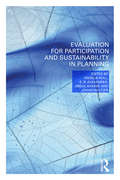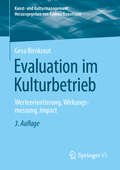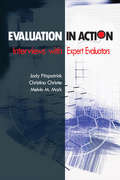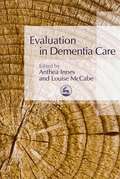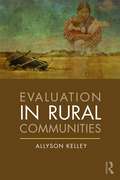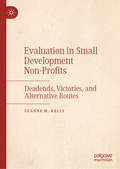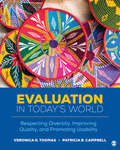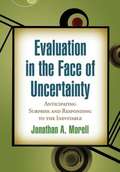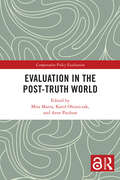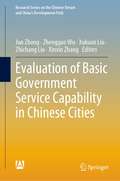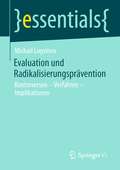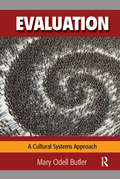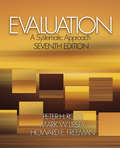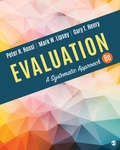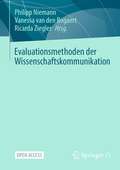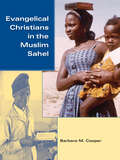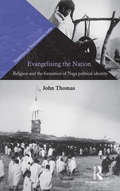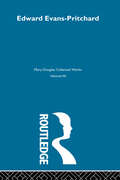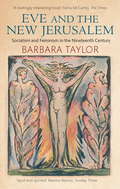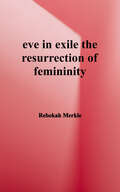- Table View
- List View
Evaluation for Participation and Sustainability in Planning
by Johan Woltjer Angela Hull E. R. Alexander Abdul KhakeePlanning evaluation is required to establish the success of planning interventions – both of physical developments and new approaches. Yet this should not be a task undertaken purely by professionals without participation by those affected by the process and outcomes of the projects. This book provides case studies and advice on how to balance conservation with economic growth, the cost effectiveness of plans alongside the effects upon the community and the importance of engaging with all stakeholders involved in a project. Practical aspects of the evaluation process covered include: how evaluation is used in planning introducing new kinds of information or criteria alternative ways of collecting/presenting information how strategic planning objectives are implemented in local practice. International contributors provide empirical studies and cases of application which are of practical value to those involved in the evaluation of planning. The book concludes by offering a new paradigm – a locally oriented, context-specific, participatory and multi-disciplinary approach to planning evaluation.
Evaluation im Kulturbetrieb: Werteorientierung, Wirkungsmessung, Impact (Kunst- und Kulturmanagement)
by Gesa BirnkrautEvaluation – und in jüngster Zeit vor allem Wirkung bzw. Impact – sind wichtige Instrumente für Kulturinstitutionen. Jedoch wird dies noch immer in vielen Fällen missverstanden, falsch genutzt oder eingesetzt, vielleicht sogar gefürchtet. Das vorliegende Buch will Kulturschaffenden und Institutionen diese Bedenken nehmen und durch Beispiele aufzeigen, welches Potential in Wirkungsmessungen liegen kann. Der Schwerpunkt liegt darauf, Evaluation als langfristigen Lerneffekt für alle Beteiligten zu betrachten. Aufbauend auf einer Definitionsdiskussion werden in dem Buch die Bereiche und Faktoren erarbeitet, die zu einer erfolgreichen Wirkungsmessung führen können. Dabei finden in der 3. Auflage auch Themen Beachtung, die im Zuge der Nachhaltigkeitsdiskussionen im Rahmen einer Gemeinwohlökonomie (wie circular economy und werteorientiertes Handeln) in der Kultur angekommen sind.
Evaluation in Action: Interviews With Expert Evaluators
by Dr Melvin M Mark Professor Jody L. Fitzpatrick Christina A. ChristieEvaluation in Action: Interviews With Expert Evaluators is the first book to go behind the scenes of real evaluations to explore the issues faced—and the decisions made—by notable evaluators in the field. Drawing from the popular "Exemplars" section in the American Journal of Evaluation (AJE), the book's twelve interviews with evaluators illustrate a variety of evaluation practices in different settings and include commentary and analysis on what the interviews teach about evaluation practice. Praise for Evaluation in Action"Evaluation in Action: Interviews With Expert Evaluators is a "must" read for those who want to know how evaluations really take place."—Marvin C. Alkin, University of California, Los Angeles"This book offers a rare opportunity to glimpse the assumptions, values, logic, and reasoning behind evaluator choices. It models the reflection required of good practice. The interviews are accessible and engaging, like being invited to a conversation over coffee—a tribute to the power of storytelling. They drew me in and made me want to join the discussion and ask even more questions. The section on cultural competence in evaluation is a particularly significant contribution to the knowledge base of our field. —Karen Kirkhart, Syracuse University, former President of American Evaluation Association "This book is unique in the breadth of evaluation types and settings covered and the interview format provides a personal, in-depth picture of the evaluator's thinking. I'm excited about using it with my students." —Katye M. Perry, Oklahoma State University, former Chair of the Topical Interest Group on Teaching of EvaluationThis book fills a major gap in evaluation literature. In addition to the cases, the introductory chapter is a masterful distillation of key issues in evaluation, while the last two chapters provide a concise analysis of the interaction of evaluation theory and practice.—Leslie Cooksy, University of Delaware "A fresh and insightful glimpse into the deliberations and choices made by practicing evaluators. The questions asked of the evaluators are right on target and give students of evaluation, whether they are in the classroom or on the job, solid guidance on navigating around the dilemmas that arise when dealing with stakeholders and with sticky ethical challenges. This text fills a need in training evaluators not met by current textboooks." —Kathryn E. Newcomer, George Washington University
Evaluation in Dementia Care
by Louise Mccabe Anthea InnesThis authoritative collection sets out the critical role and application of evaluation in identifying and developing good practice in a range of dementia care settings. The contributors discuss the evaluation of care at different levels and in various settings, particularly long stay care, covering evaluation methods, ethics, use of technology and the user's role in the evaluation process itself. Their contributions on evaluating aspects of dementia care ranging from life story work and environmental considerations to medication and dementia care mapping is a useful basis for the discussion of future challenges in evaluation of dementia care. Practical and theoretical, this wide-ranging text is essential reading for dementia care practitioners at all levels, as well as students and researchers interested in dementia care practice.
Evaluation in Rural Communities
by Allyson KelleyDoes a program work? What is the value? How do we know? These are questions that keep evaluators up at night. Continued rural community funding, employment, health, and justice depend on our answers to these questions. For evaluators working in rural communities, the task is great, but the return is even greater. Now more than ever before, evaluators have an opportunity to impact social change in rural America. Beginning with an introduction of rural community evaluation, Evaluation in Rural Communities highlights the differences in approaches to evaluation in rural areas, supported by case studies that illustrate key themes and objectives. It explores a number of issues, including • sustainability • policy • cost–benefit analysis • rural community evaluation as a platform to support social change. In particular, readers will also learn how to overcome rural community challenges, such as limited resources, the digital divide, limited funding, lower employment and educational attainment, limited opportunities for social interactions, and the distrust of outsiders. Blending aspects of community-based participatory research, empowerment evaluation, and program evaluation methods, this book is an accessible yet nuanced guide that integrates critical thinking, problem solving, social and political contexts, and outcomes related to evidence-based evaluation.
Evaluation in Small Development Non-Profits: Deadends, Victories, and Alternative Routes
by Leanne M. KellyResearch on evaluation shows that low-use and non-use of evaluation is common, yet evaluation is hailed as beneficial and worthwhile. The worth of evaluation is tied to its utilisation, presenting a paradox if evaluation is both revered and underutilised. This book investigates this paradox in the under-researched context of small development non-profit organisations, which have specific resource constraints and ‘bottom up’ community development values that complicate their ability to do and use evaluation in line with top down directives. The book examines the utility, meaningfulness, and purpose of evaluation from small non-profit perspectives, and explores whether evaluation has value for these organisations. For development practice, it presents evaluative alternatives that reconceptualise evaluation as part of the active process of development rather than as an interval-based add-on. For evaluation theory, it highlights a historical preoccupation with improving evaluation without assessing its inherent worth, and considers alternative ways to enhance the value of evaluation for small non-profits.
Evaluation in Today’s World: Respecting Diversity, Improving Quality, and Promoting Usability
by Veronica G. Thomas Patricia B. CampbellRecipient of a 2021 Most Promising New Textbook Award from the Textbook & Academic Authors Association (TAA) Evaluation in Today’s World: Respecting Diversity, Improving Quality, and Promoting Usability is a timely and comprehensive textbook that guides students, practitioners, and users of evaluations in understanding evaluation purposes, theories, methodologies, and challenges within today’s sociocultural and political context. Veronica G. Thomas and Patricia B. Campbell include discussions of evaluation history, frameworks, models, types, planning, and methods, through a social justice, diversity, and inclusive lens. The authors focus on ethics in diverse cultural contexts, help readers understand how social problems and programs get politicized and, sometimes, framed through a racialized lens, show how to engage stakeholders in the evaluation process, and communicate results in culturally appropriate ways. Included with this title: The password-protected Instructor Resource Site (formally known as SAGE Edge) offers access to all text-specific resources, including a test bank and editable, chapter-specific PowerPoint® slides.
Evaluation in Today’s World: Respecting Diversity, Improving Quality, and Promoting Usability
by Veronica G. Thomas Patricia B. CampbellRecipient of a 2021 Most Promising New Textbook Award from the Textbook & Academic Authors Association (TAA) Evaluation in Today’s World: Respecting Diversity, Improving Quality, and Promoting Usability is a timely and comprehensive textbook that guides students, practitioners, and users of evaluations in understanding evaluation purposes, theories, methodologies, and challenges within today’s sociocultural and political context. Veronica G. Thomas and Patricia B. Campbell include discussions of evaluation history, frameworks, models, types, planning, and methods, through a social justice, diversity, and inclusive lens. The authors focus on ethics in diverse cultural contexts, help readers understand how social problems and programs get politicized and, sometimes, framed through a racialized lens, show how to engage stakeholders in the evaluation process, and communicate results in culturally appropriate ways. Included with this title: The password-protected Instructor Resource Site (formally known as SAGE Edge) offers access to all text-specific resources, including a test bank and editable, chapter-specific PowerPoint® slides.
Evaluation in the Face of Uncertainty
by Jonathan MorellUnexpected events during an evaluation all too often send evaluators into crisis mode. This insightful book provides a systematic framework for diagnosing, anticipating, accommodating, and reining in costs of evaluation surprises. The result is evaluation that is better from a methodological point of view, and more responsive to stakeholders. Jonathan A. Morell identifies the types of surprises that arise at different stages of a program's life cycle and that may affect different aspects of the evaluation, from stakeholder relationships to data quality, methodology, funding, deadlines, information use, and program outcomes. His analysis draws on 18 concise cases from well-known researchers in a variety of evaluation settings. Morell offers guidelines for responding effectively to surprises and for determining the risks and benefits of potential solutions.
Evaluation in the Post-Truth World (Comparative Policy Evaluation)
by Mita Marra, Karol Olejniczak, and Arne PaulsonEvaluation in the Post-Truth World explores the relationship between the nature of evaluative knowledge, the increasing demand in decision-making for evaluation and other forms of research evidence, and the post-truth phenomena of antiscience sentiments combined with illiberal tendencies of the present day. Rather than offer a checklist on how to deal with post-truth, the experts found herein wish to raise awareness and reflection throughout policy circles on the factors that influence our assessment and policy-related work in such a challenging environment. Journeying alongside the editor and contributors, readers benefit from three guiding questions to help identify specific challenges but tools to deal with such challenges: How are policy problems conceptualized in the current political climate? What is the relationship between expertise and decision-making in today’s political circumstances? How complex has evaluation become as a social practice?Evaluation in the Post-Truth World will benefit evaluation practitioners at the program and project levels, as well as policy analysts and scholars interested in applications of evaluation in the public policy domain.Chapters 6, and 11 of this book are freely available as a downloadable Open Access PDF at http://www.taylorfrancis.com under a Creative Commons [Attribution-Non Commercial-No Derivatives (CC-BY-NC-ND)] 4.0 license.
Evaluation of Basic Government Service Capability in Chinese Cities (Research Series on the Chinese Dream and China’s Development Path)
by Jun Zhong Zhenggao Wu Xukuan Liu Zhichang Liu Xinxin ZhangThis book reports on the results of a survey of 38 major Chinese cities’ public service performances and provides an overview of the development of basic public services in the larger cities. The quality of urban public services is examined from 9 different perspectives: basic healthcare and public health, housing, public transportation, public security, employment and social security, compulsory education, urban environment, culture and sports, and government services. Moreover, a series of indices are applied to further study the degree of public satisfaction with basic public services in these cities. These indices include the index of GDP leveraging satisfaction with basic public services, the rising index of satisfaction with basic public services in cities, and the development index of satisfaction with the basic public service elements. On the basis of the survey results, this book also identifies the most important social issues among the surveyed public, including food and drinking water safety, information security, housing prices, pensions, and air and environment quality.
Evaluation und Radikalisierungsprävention: Kontroversen – Verfahren – Implikationen (essentials)
by Michail LogvinovDieses essential befasst sich mit Paradigmen und Verfahren der Evaluation und schlägt einen Bogen zu aktuellen Kontroversen rund um das Thema „Evaluationsansätze in der Radikalisierungsprävention“. Michail Logvinov zeichnet Defizite der Evidenzschaffung nach und formuliert Vorschläge für die Wissenschaft und Praxis. Darüber hinaus plädiert er für eine Intensivierung des Wissenstransfers zwischen der Evaluationsforschung und Fachpraxis mit dem Ziel, gegenstandsadäquate wirkungsorientierte Evaluationsdesigns zu entwickeln und zu testen.
Evaluation: A Cultural Systems Approach
by Mary Odell ButlerIn an era of budgetary belt-tightening, policymakers must prove that their programs work or face drastic cuts in spending. This book, informed by the author’s many years of practice in program evaluation and expertise as an anthropologist, discusses in plain prose the theory and methods of culturally-competent evaluation across a number of disciplines, such as health and education, for graduate and advanced undergraduate students and professionals. The book-guides readers through the process of evaluation in complex contexts created by cultural change, the movement of populations, economic forces and constantly emerging crises;-introduces rich ethnographic theory and methods developed by anthropologists to evaluators in other fields;-teaches anthropologists and other social scientists research techniques developed in such fields as business or public-policy evaluation;-provides a strategy for building evidence from both qualitative and quantitative sources to form conclusions that have scientific credibility.
Evaluation: A Systematic Approach
by Dr Peter H. Rossi Mark W. Lipsey Dr Howard E. FreemanSince Peter H. Rossi, Mark W. Lipsey, and Howard E. Freeman first published Evaluation: A Systematic Approach, more than 90,000 readers have considered it the premier text on how to design, implement, and appraise social programs through evaluation. In this, the completely revised Seventh Edition, authors Rossi and Lipsey include the latest techniques and approaches to evaluation as well as guidelines to tailor evaluations to fit programs and social contexts. With decades of hands-on experience conducting evaluations, the authors provide scores of examples to help students understand how evaluators deal with various critical issues. They include a glossary of key terms and concepts, making this the most comprehensive and authoritative evaluation text available. Thoroughly revised, the Seventh Edition now includes * Substantially more attention to outcome measurement * Lengthy discussions of program theory, including a section about detecting program effects and interpreting their practical significance * An augmented and updated discussion of major evaluation designs * A detailed exposition of meta-analysis as an approach to the synthesis of evaluation studies * Alternative approaches to evaluation * Examples of successful evaluations * Discussions of the political and social contexts of evaluation
Evaluation: A Systematic Approach
by Gary T. Henry Dr Peter H. Rossi Mark W. LipseyThe long-awaited new edition is here! Evaluation: A Systematic Approach, by Peter H. Rossi, Mark W. Lipsey, and Gary T. Henry, is the best-selling comprehensive introduction to the field of program evaluation, covering the range of evaluation research activities used in appraising the design, implementation, effectiveness, and efficiency of social programs. Evaluation domains are presented in a coherent framework that not only explores each, but recognizes their interrelationships, their role in improving social programs and the outcomes they are designed to affect, and their embeddedness in social and political context. Relied on as the “gold standard” by professors, students, and practitioners for 40 years, the new Eighth Edition includes a new practical chapter on planning an evaluation, entirely new examples throughout, and a major re-organization of the book’s content to better serve the needs of program evaluation courses
Evaluation: A Systematic Approach
by Gary T. Henry Dr Peter H. Rossi Mark W. LipseyThe long-awaited new edition is here! Evaluation: A Systematic Approach, by Peter H. Rossi, Mark W. Lipsey, and Gary T. Henry, is the best-selling comprehensive introduction to the field of program evaluation, covering the range of evaluation research activities used in appraising the design, implementation, effectiveness, and efficiency of social programs. Evaluation domains are presented in a coherent framework that not only explores each, but recognizes their interrelationships, their role in improving social programs and the outcomes they are designed to affect, and their embeddedness in social and political context. Relied on as the “gold standard” by professors, students, and practitioners for 40 years, the new Eighth Edition includes a new practical chapter on planning an evaluation, entirely new examples throughout, and a major re-organization of the book’s content to better serve the needs of program evaluation courses
Evaluationsmethoden der Wissenschaftskommunikation
by Philipp Niemann Vanessa van den Bogaert Ricarda ZieglerDies ist ein Open-Access-Buch.Akteure und Fördergeber von Wissenschaftskommunikation beschäftigt zunehmend die Frage, welche Wirkungen von ihren Aktivitäten tatsächlich ausgehen und ob sie ihre Ziele damit eigentlich erreichen. Wer liest das Weblog eines Forschungsprojekts? Ändert der Besuch eines Science-Slams nachhaltig den Blick des Publikums auf Wissenschaft? Wie zufrieden sind die Beteiligten mit einer Diskussionsveranstaltung? Der Band bietet einen Überblick über wissenschaftliche Designs und Methoden zur Evaluation von Wissenschaftskommunikation. Er vereint dabei sowohl quantitative als auch qualitative Zugänge, Forschung und Praxis, und beleuchtet das Thema aus unterschiedlichen disziplinären Perspektiven.
Evangelical Christians in the Muslim Sahel (African Systems of Thought)
by Barbara M. CooperThis “fascinating historical account” of a Christian mission in Niger offers a personal and richly detailed look at religious institutions in the region (Religious Studies Review).Barbara M. Cooper looks closely at the Sudan Interior Mission, an evangelical Christian mission that has taken a tenuous hold in a predominantly Hausa Muslim area on the southern fringe of Niger. Based on sustained fieldwork, personal interviews, and archival research, this vibrant, sensitive, compelling, and candid book gives a unique glimpse into an important dimension of religious life in Africa.Cooper’s involvement in a violent religious riot provides a useful backdrop for introducing other themes and concerns such as Bible translation, medical outreach, public preaching, tensions between English-speaking and French-speaking missionaries, and the Christian mission’s changing views of Islam.
Evangelical Pilgrims from the East
by Sunggu YangIn this book Sunggu Yang proposes five socio-ecclesial codes as unique faith fundamentals of Korean American Christianity. Drawing from rigorous research and years of ecclesial experience, Yang names the codes as follows: the Wilderness Pilgrimage code, the Diasporic Mission Code, the Confucian Egalitarian code, the Buddhist Shamanistic code, and the Pentecostal Liberation code. These five codes, he asserts, help Korean Americans sustain their lives, culture, faith, and evangelical mission as aliens or "pilgrims" in the American "wilderness. " Yang outlines how his five proposed codes serve as liberative and prophetic mechanisms of faith through which Korean Americans can contribute to racial harmony and cultural diversity in North America. In this sense, Korean American Christianity--its theology and spirituality--works not only on behalf of Korean Americans, but also for the sake of all Americans. Yang shows how the Korean American pulpit is the locus where these five codes appear most vividly.
Evangelicalism and the Politics of Reform in Northern Black Thought, 1776-1863 (Antislavery, Abolition, and the Atlantic World)
by Rita RobertsDuring the revolutionary age and in the early republic, when racial ideologies were evolving and slavery expanding, some northern blacks surprisingly came to identify very strongly with the American cause and to take pride in calling themselves American. In this intriguing study, Rita Roberts explores this phenomenon and offers an in-depth examination of the intellectual underpinnings of antebellum black activists. She shows how conversion to Christianity led a significant and influential population of northern blacks to view the developing American republic and their place in the new nation through the lens of evangelicalism. American identity, therefore, even the formation of an African ethnic community and later an African American identity, developed within the evangelical and republican ideals of the revolutionary age. Evangelical values, Roberts contends, exerted a strong influence on the strategies of northern black reformist activities, specifically abolition, anti-racism, and black community development. The activists and reformers' commitment to the United States and firm determination to make the country live up to its national principles hinged on their continued faith in the possibility of the collective transformation of all Americans. The people of the United States -- both black and white -- they believed, would become a new citizenry, distinct from any population in the world because of their commitment to the tenets of the Christian republican faith. Roberts explores the process by which a collective identity formed among northern free blacks and notes the ways in which ministers and other leaders established their African identity through an emphasis on shared oppression. She shows why, in spite of slavery's expansion in the 1820s and 1830s, northern blacks demonstrated more, not less, commitment to the nation. Roberts then examines the Christian influence on racial theories of some of the major abolitionist figures of the antebellum era, including Frederick Douglass, Martin Delany, and especially James McCune Smith, and reveals how activists' sense of their American identity waned with the intensity of American racism and the passage of laws that further protected slavery in the 1850s. But the Civil War and Emancipation Proclamation, she explains, renewed hope that America would soon become a free and equal nation.Impeccably researched, Evangelicalism and the Politics of Reform in Northern Black Thought, 1776--1863 offers an innovative look at slavery, abolition, and African American history.
Evangelising the Nation: Religion and the Formation of Naga Political Identity (Transition in Northeastern India)
by John ThomasNortheast India has witnessed several nationality movements during the 20th century. The oldest and one of the most formidable has been that of the Nagas — inhabiting the hill tracts between the Brahmaputra river in India and the Chindwin river in Burma (now Myanmar). Rallying behind the slogan, ‘Nagaland for Christ’, this movement has been the site of an ambiguous relation between a particular understanding of Christianity and nation-making. This book, based on meticulous archival research, traces the making of this relation and offers fresh perspectives on the workings of religion in the formation of political and cultural identities among the Nagas. It tracks the transmutations of Protestantism from the United States to the hill tracts of Northeast India, and its impact on the form and content of the nation that was imagined and longed for by the Nagas. The volume also examines the role of missionaries, local church leaders, and colonial and post-colonial states in facilitating this process. Lucidly written and rigorous in its analyses, this book will be of interest to scholars and researchers of South Asian history, religion, political science, sociology and social anthropology, and particularly those concerned with Northeast India.
Evanira Mendes: A Voice from the Brazilian Folklore Movement
by Eric A. GalmThis compilation of Evanira Mendes’s biography and translated publications offers for the first time in English an opportunity to revisit the music and culture of 1950s Brazil. Examining the trajectory of the Brazilian folklore movement, this book provides a new perspective on contemporary accounts that have overlooked the participation of women scholars from that era and seeks to grant Mendes the recognition she so richly deserves. Growing up on a farm in rural São Paulo State, Evanira Mendes (1929–2022) exhibited an early love of folklore, cultivated through the stories, songs, and gossip of wandering travelers in exchange for food and shelter. As she got older, she entered the Conservatório Dramático e Musical de São Paulo to study piano, but her love of folklore persisted, and she was invited to work in the school’s folklore archive and later as a folklore researcher for the São Paulo Folklore Commission from 1949 to 1959. There, she won awards including the national Sílvio Romero Medal; won second place in a national folklore monograph competition; helped to organize the folklore pavilion at the IV° Centenário de São Paulo celebration; and worked closely with important names of the era. Despite these accomplishments, she has essentially been forgotten. This book follows Evanira Mendes’s experiences working as a field researcher as part of the São Paulo Folklore Commission, her participation and organization at national and international folklore conferences, her participatory research in Afro-Brazilian community dances and observation and critique of Brazilian modern artistic expression in the theaters of São Paulo, and her work as editor of the folklore page and later weekly columnist in the Correio Paulistano newspaper. Her first-person accounts of fieldwork and participation in folklore courses are supplemented by separate published accounts from various sources, helping to compile a comprehensive portrait of music and culture in São Paulo and Brazil from that era.
Evans-Pritchard (Modern Masters Ser.)
by Mary DouglasFirst published in 1980, this book provides an overview of E. E. Evans-Pritchard's approach to anthropology. His seminal works on the Azande and the Nuer had an immense impact on the field in Britain. He wrote these works in his thirties and forties, after which time he became chair of anthropology at Oxford. His pupils and colleagues from his days as the head of Institute of Social Anthropology went from Oxford to complete the institutional establishment of social anthropology. In this book Douglas links the development of her own theories to her training under Evans-Pritchard at the institute and to the close friendship that they forged in the years after.
Eve & The New Jerusalem: Socialism and Feminism in the Nineteenth Century
by Barbara TaylorA new edition of Barbara Taylor's classic book, with a new introduction.In the early nineteenth century, radicals all over Europe and America began to conceive of a 'New Moral World', and struggled to create their own utopias, with collective family life, communal property, free love and birth control. In Britain, the visionary ideals of the Utopian Socialist, Robert Owen, attracted thousands of followers, who for more than a quarter of a century attempted to put theory into practice in their own local societies, at rousing public meetings, in trade unions and in their new Communities of Mutual Association.Barbara Taylor's brilliant study of this visionary challenge recovers the crucial connections between socialist aims and feminist aspirations. In doing so, it opens the way to an important re-interpretation of the socialist tradition as a whole, and contributes to the reforging of some of those early links between feminism and socialism.
Eve In Exile: And the Restoration of Femininity
by Rebekah MerkleThe swooning Victorian ladies and the 1950s housewives genuinely needed to be liberated. That much is indisputable. So, First-Wave feminists held rallies for women's suffrage. Second-Wave feminists marched for Prohibition, jobs, and abortion. Today, Third-Wave feminists stand firmly for nobody's quite sure what. But modern women -- who use psychotherapeutic antidepressants at a rate never before seen in history -- need liberating now more than ever. The truth is, feminists don't know what liberation is. They have led us into a very boring dead end. Eve in Exile sets aside all stereotypes of mid-century housewives, of China-doll femininity, of Victorians fainting, of women not allowed to think for themselves or talk to the men about anything interesting or important. Once those fictionalized stereotypes are out of the way -- whether they're things that make you gag or things you think look pretty fun -- Christians can focus on real women. What did God make real women for?
